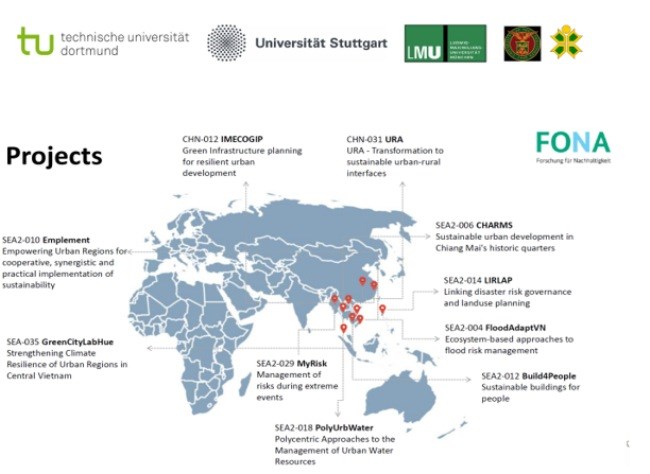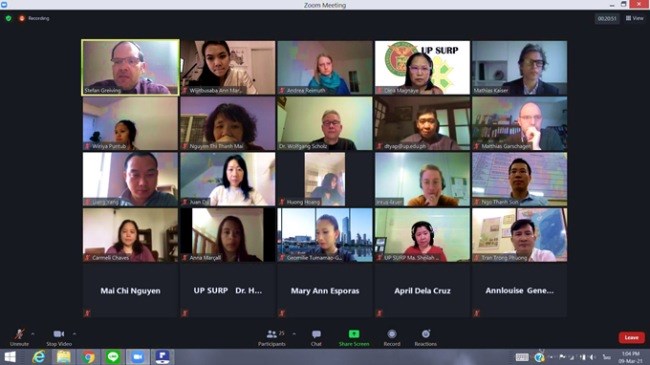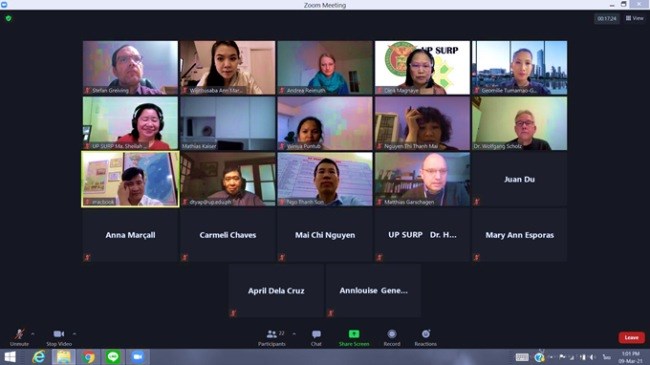Disasters in cities can be caused by natural processes (climate change and geophysical disasters) and by human beings. Understanding disaster risk is a prerequisite for not only disaster risk reduction (DRR) but also climate change impact assessment and effective adaptation strategies, particularly during the land use planning for those vulnerable areas.
On March 9, 2021, the LIRLAP project officially organized an Inception Workshop for partners in Southeast Asia (Philippines, Thailand, and Vietnam). In Vietnam, the German side has cooperated with Vietnam National University of Agriculture, Hanoi University of Civil Engineering, and Southern Institute of Social Sciences. Through the process of exchange and cooperation, the German side has chosen Vietnam National University of Agriculture (specifically the Faculty of Land Management) as an official partner to implement the project "Linking disaster risk governance and land-use planning: Case Study in resettlement area in vulnerable areas, Philippines (LIRLAP), 2021-2024”. This project is funded by the German Federal Ministry for Economic Cooperation and Development (BMZ). The research team implementing the project at Vietnam National University of Agriculture includes Assoc. Prof. Dr. Tran Trong Phuong, as the project coordinator in Vietnam, Dr. Ngo Thanh Son and some other members in the Faculty of Land Management.
During the four-year R&D period from 2021 to 2024, the LIRLAP project's goal is to implement the following contents:
a. Designing/developing future upgradation/resettlement scenarios and urbanization models through the identification of land areas suitable for relocation at the regional level;
b. Integrating the results of upgrading resilience/resettlement into national, regional and local disaster management and spatial policies in the Philippines and selectively replicating certain strategies in Vietnam and Thailand; and
c. Establishing a PhD program between TU Dortmund University (TUDO) with UP SURP and disaster management training courses.
 |
| Framework of the LIRLAP, 2021-2024 |
Attending the workshop were about 25 delegates from the BMZ sponsoring agency. On the side of Vietnam National University of Agriculture (VNUA), there was Assoc. Prof. Dr. Tran Trong Phuong, Deputy Dean of Faculty of Land Management; Dr. Ngo Thanh Son, Department of Water Resources, Faculty of Land Management; MSc. Hoang Le Huong, Consulting Center for Science and Technology, Natural Resources and Environment; and representatives of Vietnamese partners including Assoc. Prof. Dr. Nguyen Thi Thanh Mai, Construction University and Assoc. Prof. Dr. Le Thanh Sang, Southern Institute of Social Sciences. In addition, the participants of the workshop also included professors from the Faculty of Urban and Regional Planning, University of the Philippines Diliman (UP SURP) and the Institute of Space Planning (IRPUD) at TU Dortmund University (TUDO), the Institute of Regional Development Planning and Space (IREUS) of the University of Stuttgart and the research group on human environment interaction, Faculty of Geography of the Ludwig-Maximilians-Universität München (LMU) University.
It is expected that the results of the project will help to form and propose a framework of land use in identifying suitable land areas at the regional level for resettlement and upgrading as well as integrating research findings of the project with Vietnamese policies and implementing a coordinative PhD program between the Faculty of Land Management (VNUA) with LMU.
 |
| Participants attending the LIRLAP project inception workshop |
At the workshop, Assoc. Prof. Dr. Tran Trong Phuong, on behalf of the LIRLAP project team of Vietnam, introduced the component project “Developing alternative scenarios of risks that have occurred and the urbanization model through identifying land areas suitable for relocation at regional level in collaboration with LMU group, Federal Republic of Germany and PhD program in conjunction with UP SURP, Philippines and LMU, Federal Republic of Germany”.
 |
| Assoc. Prof. Dr. Tran Trong Phuong presents the project component in Vietnam |